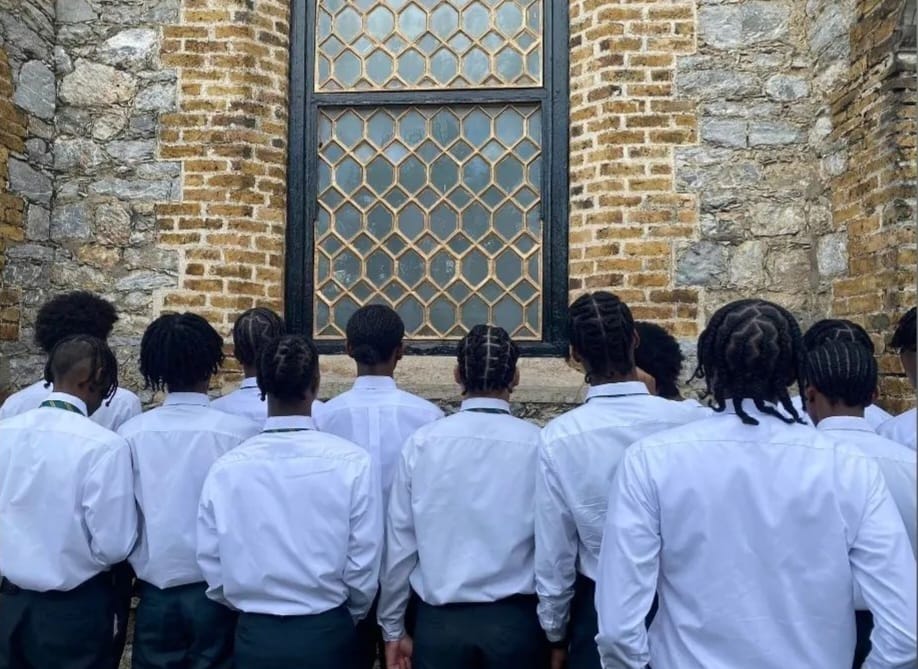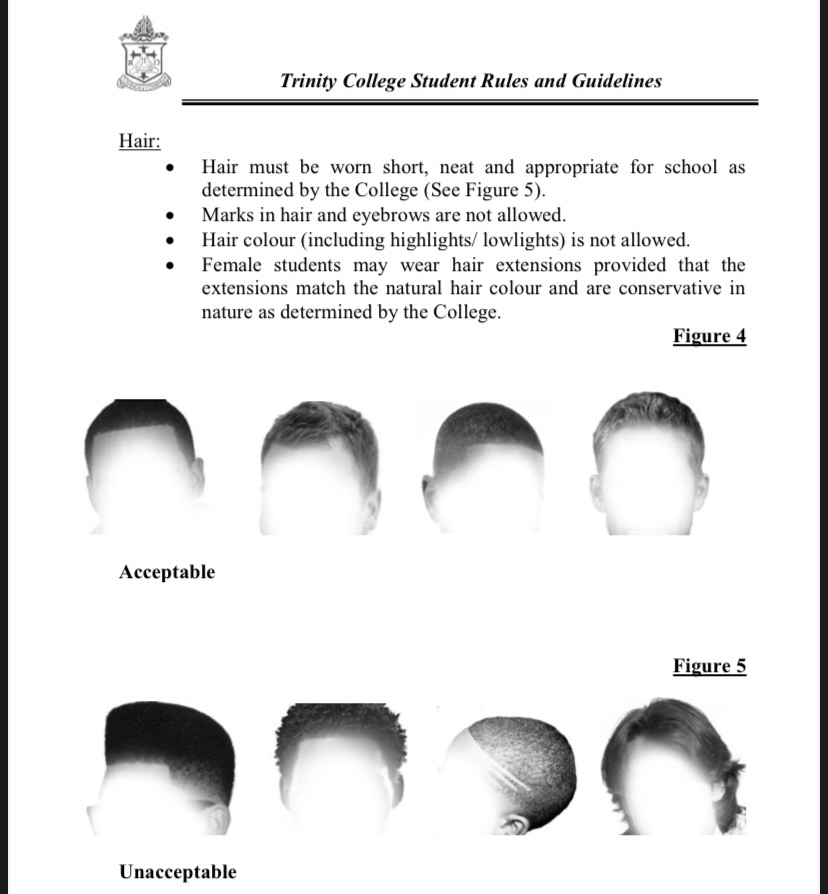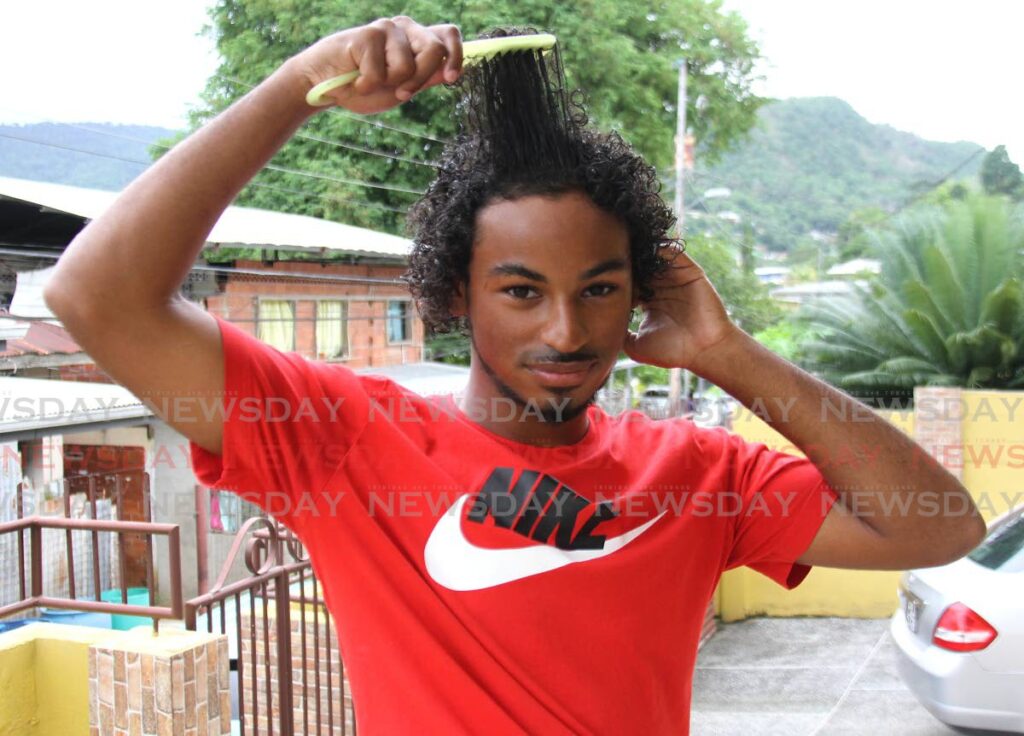[UPDATED] Trinity students protest at grad: BAD HAIR RULES

SCORES of parents and students of the 2023 graduating class of Trinity College, Moka, hurled obscenities and displeasure during the much-anticipated ceremony. The reason? Students' hair.
Form five and six students of the Maraval-based Anglican school graduated at the All Saints Anglican Church, Port of Spain on Tuesday.
A Facebook post by the relative of one of the students has since gone viral, in which she claimed several male students were "segregated."
"These children were ushered and rushed in through the side entrance like slaves because of their hair. These children were not allowed to walk in through the front entrance along with their fellow graduates because of their hair. These students names were not called to receive their certificates because of their hair..."
She added that those same students were accidentally called to the stage but told to return to their seats.
"These students were being told by their admin, for over a year, that they need to cut off their hair."
She said the students, some who were part of the student council, have the right to be themselves and keep their hair.
She continued, "These children whose parents when speaking up about this blatant discrimination and disrespect were told to 'Shh.'"
She said the students were confused and hurt.
Many people have since slammed the school for the incident.
The school's rules and guidelines booklet says students' hair must be "worn short, neat and appropriate for school as determined by the college."
It says marks in students' hair are not allowed, as well as coloured hair.
It also says female students who choose to wear braids or weave must ensure the extensions are the same colour of their natural hair and "are conservative in nature as determined by the college."
These rules are accompanied by a photo of four acceptable hairstyles for boys and unacceptable ones.

The original poster told Newsday that some students were crying at the ceremony, while others asked their teachers if something is wrong with their natural hair.
"Another one of the children told their teacher: 'But miss, I combed my hair,'" she said.
"There was nothing wrong with these children's hair," she told Newsday, adding that many of them styled their hair in anticipation of the school's dinner on Wednesday night.
"Why should they have to cut their hair in 2023? Update the rule book!"
When she saw students being separated, she assumed it was for a mid-ceremony performance of some sort.
She said it was only after a representative from the Ministry of Education came there, that those students were eventually allowed to collect their certificates.
Students: rules must change
Form six graduand Terell Cherriandy-George said while he understands there are rules, "They singled out cornrows as (not being neat)."
Despite his hair not being styled in that way for the ceremony, he said he has a problem with this stance by the school.
Cherriandy-George, who has short curls, was among the group of students prevented from receiving their certificates during the main ceremony.
On not being able to cross the stage initially, he said, "It wasn't a good feeling but I could have accepted it because this isn't new to the school."

He said many students allowed their hair to grow out during the height of the covid19 pandemic and kept it that way.
He said it's unfair to expect someone's hair to be one particular way when there are so many textures and varieties.
He said the rules "definitely" need to change, because he believes canerows and plaits are just as neat as any of the acceptable hairstyles.
A form five graduand who asked not to be named said he "accepted his fate" long before the ceremony and refused to cut his hair.
"They've been warning us, for a year or two, in advance of this."
But he said how the issue unfolded during the ceremony was "very bad."
"Parents cursed the principal, carried on, used obscenities in the church...It was, quite frankly, embarrassing."
On the rules, he said they are outdated and archaic but: "This was not the way to bring about change.
"I believe if we have to bring about change with the admin and stuff, we can go about it differently.
"I think the rules should change because we're in a different society where people would like to express themselves in different ways with their hairstyles...We could allow students to express themselves and still have it neat. Tweak the rule a bit so everybody can express themselves and their own individuality."
He said at the school, male students can only have long hair if they have a valid medical or religious explanation.
Form six graduand Zanoah Wilson confirmed that he was told about a requirement to cut his hair well in advance of the ceremony. He added that e-mails had also been sent to students' parents.
But he said on the day, some parents were still unaware of this.
"It turned into a situation where they felt unheard and (like it was) unfair to them."
He added, "I'm not saying that I fully agree with the rules of the school, in that sense, at this day and age but I was aware of what would happen, so I'm not against the school (with respect to) what happened."
He said he got his certificate after the ceremony and he was okay with that.
Wilson, who has curly hair, said he believes his hair is "neat enough for him," but that neatness tends to be a matter of opinion.
He disagreed with the claims on social media by some that only black students were targeted.
"I am also a mixed-race person and I was also told I couldn't cross.
"The majority of the school (population) is black so I understand where it could be seen as a racial thing but I believe it's a more diverse situation..."

However, he also believes that the hairstyles of the black students who were not allowed to cross the stage were neat.
"(Their hair was) plaited and groomed well," he said.
But he said some of the students also had issues with their uniform including belts and shoes.
Asked if the rules should be changed, he said yes, it should be reviewed.
"There should be certain guidelines for the change itself...It should have certain allowances granted for hair like maybe if it's neat a certain way, regularly, once your grades are up to a certain standard..."
He said his parents were unable to attend the ceremony but after hearing about the issue: "They agreed that the school has rules and regardless of how we feel as individuals, we knew what was going to take place so we should have adhered to the school rules."
He said four of his friends, who were also affected, agree with what his parents said.
He added, "Going forward, they should talk about it but to say it was unheard of...It was a little bit blown out of proportion."
Jovan Henry-Ali, who was the head prefect for the last two years, said he has been lobbying for changes to the rules regarding hairstyles.
"There is some ambiguity in the rule book...They just have it as 'well groomed' and that is subjective. Everybody has their own view of what is groomed."
But he said despite the rules being archaic, they need to be upheld.
He said there was a "uniform inspection" just before the ceremony and any student whose hairstyle went against school rules or whose uniform went against it, was removed from the group.
"They were taken to a separate entrance and seated before we walked in. So parents were like, 'Huh, that's weird.'"
He said parents were booing, yelling and saying it was an act of racism.
He disagrees with the statement about racism and said it was simply about conforming to the rules.
He said there were boys of other races who were not allowed to cross the stage because of their hair.
But he reiterated that the school's rules "do not take into account the cultural diversity of (the school)."
"We have been advocating for change and we wanted a more inclusive handbook."
He said the rules are rarely, harshly enforced, so many of these students would have had their hair styled in these ways for years and nothing was done.
Because of this, he suggested, some may have thought the rules would not have been upheld for the graduation as well.
Attorney and political activist Kareem Marcelle, a past student of the school, took to Facebook saying if those are the rules, they must be consistently upheld.
"You can’t accept/allow students to attend the college for YEARS and/or MONTHS with their hair in plaits/cornrows and then NOW choose to enforce the rules only on their graduation day. "Further, if it’s ONE day the school ought to show compassion and leniency is the last day of these students’ secondary level education journey."
He said such archaic rules should not exist in a modern society.
"To our Moka cubs who had to endure that level of embarrassment and hurt on what should have been the most momentous day of your lives thus far, my heart goes out to you and your families. Stand strong! This unfortunate incident may very well be the reason we have meaningful reform in our college’s school rules and across TT.
Principal, education minister react
In a video circulating social media, the school's principal Ann Niles addressed the issue during the ceremony and said the students had been warned over a year ago.
She said it was "disheartening" to hear comments like: "My parents say I am leaving just now. Why do I need to address my hair?"
She asked, "Is that (the message) we are sending as a unit? We have indicated weekly for a period of time, last year in terms of the expectations and for the last few weeks, if you open your notices, you'll see it includes hairstyles."
She said a student asked her why he needed to cut his hair for one day, and she told him he was supposed to do so "more than a year ago."
Calling out parents, she urged them to "multiply" how they are feeling "by over a year."
In a Facebook post on Wednesday, Education Minister Dr Nyan Gadsby-Dolly said the incident was unfortunate and regrettable. However, she reminded the public that "societal order depends on rule keeping."
She said after reviewing reports from "various perspectives...
"It is clear that regardless of where blame may or may not be apportioned, the graduating students of Trinity College, and in particular a group of young men, had a negative experience on a day which would have been anticipated and planned for as a highlight of their secondary school experience."
She said from what she has been told, the rules were made clear to students and teachers ahead of time.

"However, the question of the suitability of the graduation ceremony as a forum to enforce the rules of a school, from which students were actively graduating, is a valid one."
She continued, "Regardless of one's emotional and visceral response to this issue, it is a fact that societal order depends on rule-keeping, and that is a critical facet of the education schools are meant to impart.
"No matter how non-conformist one's outlook, we all follow some rule or the other – for example, driving on the authorised side of the road. Therefore, the practice of adherence to school rules is important, and where there are divergent views, dialogue, rather than open confrontation, should be encouraged, especially in a school setting."
She said a critical conversation has arisen from this issue, "which speaks to the standardisation of the rules and removal of subjectivity which surrounds school hairstyles, especially for male students. Issues over students' hairstyles have arisen on numerous occasions in the past.
"The time for this conversation in TT has come, and decisions will be taken for implementation in the upcoming academic year, based on the Ministry of Education's discussions with our valued stakeholders."
One student, via Instagram, said his mother and the "MoE" (Minister/Ministry of Education) have a good relationship so a call was made and a representative came.
Asked about this, Gadsby-Dolly told Newsday: "I don't know the student nor his mother and I received no call."
Calls to representatives of the Anglican board went unanswered up to press time.
This story was originally published with the title "Education Minister: Hairstyle issue at Trinity College 'unfortunate,' 'regrettable'" and has been adjusted to include additional details. See original post below.
EDUCATION Minister Dr Nyan Gadsby-Dolly says an incident involving issues surrounding students' hair at a recent secondary school graduation ceremony was unfortunate and regrettable.
However, she reminded the public that "societal order depends on rule-keeping." A viral social media post claimed several boys from Trinity College, Moka, were treated unfairly during their graduation ceremony on Tuesday and prevented from collecting certificates because of their hair.
The photos attached to the post show boys with plaits or canerows, as well as short, curly hair.
Many have since slammed the school for excluding them from the ceremony, calling the rules archaic.
Trinity College is an Anglican school.
In a Facebook post on Wednesday, Gadsby-Dolly said after reviewing reports from various perspectives, "It is clear that regardless of where blame may or may not be apportioned, the graduating students of Trinity College, and in particular a group of young men, had a negative experience on a day which would have been anticipated and planned for as a highlight of their secondary school experience."
She said from what she had been told, the rules were made clear to students and teachers ahead of time.
But she said it was valid to question whether it was appropriate to use their graduation ceremony as a forum to enforce the school rules.
"Regardless of one's emotional and visceral response to this issue, it is a fact that societal order depends on rule-keeping, and that is a critical facet of the education schools are meant to impart.
"No matter how non-conformist one's outlook, we all follow some rule or the other – for example, driving on the authorised side of the road. Therefore, the practice of adherence to school rules is important, and where there are divergent views, dialogue, rather than open confrontation, should be encouraged, especially in a school setting."
She said a critical conversation has arisen from this issue, "which speaks to the standardisation of the rules and removal of subjectivity which surrounds school hairstyles, especially for male students."
Issues over students' hairstyles have arisen on numerous occasions in the past.
Gadsby-Dolly acknowledged: "The time for this conversation in TT has come, and decisions will be taken for implementation in the upcoming academic year, based on the Ministry of Education's discussions with our valued stakeholders."


Comments
"[UPDATED] Trinity students protest at grad: BAD HAIR RULES"